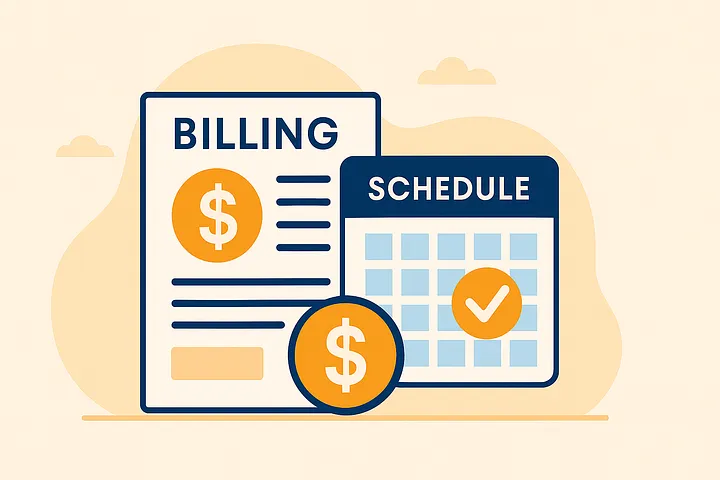Milestone Billing in Salesforce Revenue Cloud

For service-based industries, flexible billing models are a necessity, not just an advantage. Traditional billing methods often fall short for professional services projects or milestone-based engagements. This is where Milestone Billing in Salesforce Revenue Cloud comes in, offering precise control over when and how customers are billed.
Why Milestone Billing?
Imagine you’re delivering a six-month professional services project. Instead of billing your customer all at once, it's more logical to bill them as you make progress. For example:
- Kick-off Completion
- System Configuration
- User Training
- Go-Live
This is exactly what Milestone Billing allows, linking payments directly to project achievements.
Key Capabilities of Milestone Billing
Milestone Billing enables you to define billing points based on project milestones rather than rigid timelines. Currently, this feature applies only to One-Time Products.
Milestone Types
- Event-based: Triggered by specific business events, like the completion of a project phase.
- Date-based: Calculated based on an offset from the Order Activation Date, making it easy to align billing with the deal's lifecycle.
Billing Setup in Salesforce Revenue Cloud
Here’s how to implement Milestone Billing using standard configuration:
1. Create a Billing Policy
A Billing Policy is a configuration that holds your billing rules. You link it to products using the BillingPolicyId lookup field on the Product2 object.
2. Define Billing Treatments
A Billing Treatment defines how the billing should happen (e.g., based on a milestone, usage, or percentage).
3. Add Billing Treatment Items
These represent individual milestones. For each item, you specify its type (event or date), offset (for date-based milestones), and the percentage or flat amount to be billed.
4. Override at the Order Level
Sales users can override the default product treatment by selecting a different one during the order lifecycle using the OrderProduct.BillingTreatmentId field. This provides flexibility on a deal-by-deal basis.
Real-World Scenario: A Professional Services Project
- Company: CloudPro Solutions
- Engagement: Salesforce implementation for a large financial services client
- Contract Value: $200,000 over 6 months
Milestone Billing Schedule:
- 10% at Kick-off
- 30% at Design Completion
- 30% at UAT Sign-off
- 30% at Go-live
This setup is achieved by creating a Billing Policy and a corresponding Billing Treatment with items for each phase. The sales user can then select this tailored treatment at the Order Product level when closing the deal.
The Benefits
- Predictable Revenue Recognition: Match revenue directly with project milestones, improving financial forecasting.
- Customer Trust and Satisfaction: Customers pay based on tangible progress, which enhances transparency and fairness.
- Operational Flexibility: Sales teams can adjust billing logic for each deal without needing custom code.
Final Thoughts
With just a few clicks, Milestone Billing in Revenue Cloud simplifies complex service-based billing. Salesforce provides a powerful billing engine that responds to actual project requirements, supporting both event- and date-based milestones within an easily maintainable framework.
Start small by piloting milestone billing with one product or service, then scale it across your organization to unlock both customer satisfaction and operational efficiency.
Take Action
If your business struggles to align billing with project delivery, Salesforce Revenue Cloud is purpose-built to turn this challenge into a strategic advantage.